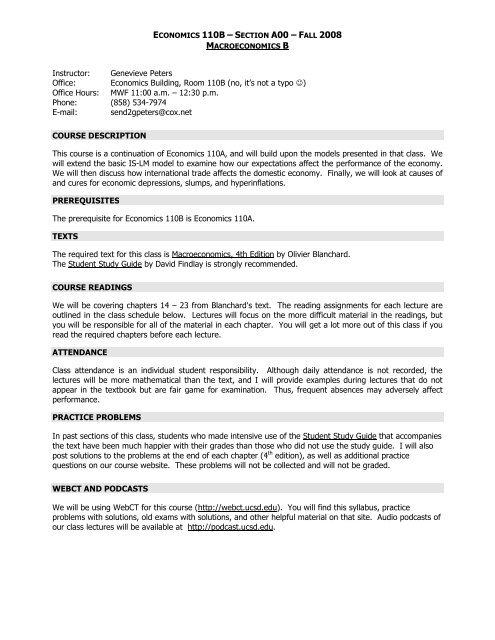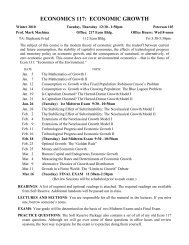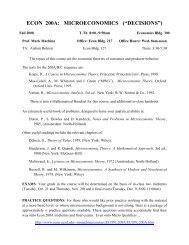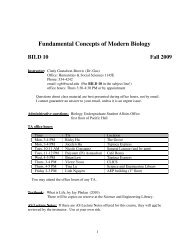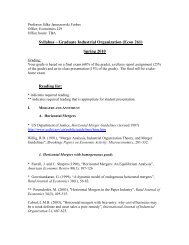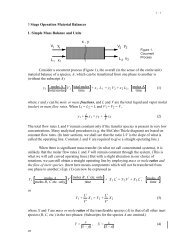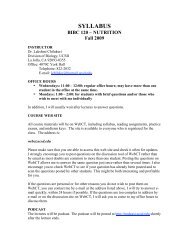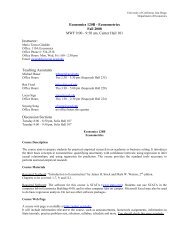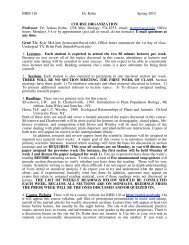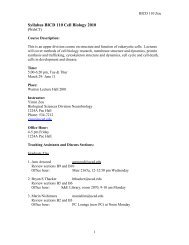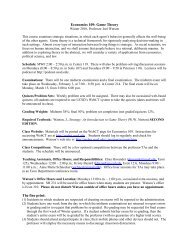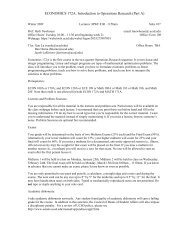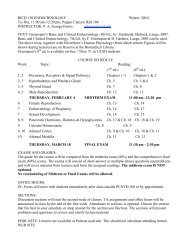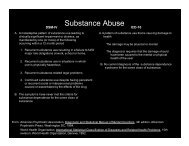ECONOMICS 110B – SECTION A00 – FALL 2008 - Courses
ECONOMICS 110B – SECTION A00 – FALL 2008 - Courses
ECONOMICS 110B – SECTION A00 – FALL 2008 - Courses
You also want an ePaper? Increase the reach of your titles
YUMPU automatically turns print PDFs into web optimized ePapers that Google loves.
<strong>ECONOMICS</strong> <strong>110B</strong> <strong>–</strong> <strong>SECTION</strong> <strong>A00</strong> <strong>–</strong> <strong>FALL</strong> <strong>2008</strong><br />
MACRO<strong>ECONOMICS</strong> B<br />
Instructor: Genevieve Peters<br />
Office: Economics Building, Room <strong>110B</strong> (no, it’s not a typo )<br />
Office Hours: MWF 11:00 a.m. <strong>–</strong> 12:30 p.m.<br />
Phone: (858) 534-7974<br />
E-mail: send2gpeters@cox.net<br />
COURSE DESCRIPTION<br />
This course is a continuation of Economics 110A, and will build upon the models presented in that class. We<br />
will extend the basic IS-LM model to examine how our expectations affect the performance of the economy.<br />
We will then discuss how international trade affects the domestic economy. Finally, we will look at causes of<br />
and cures for economic depressions, slumps, and hyperinflations.<br />
PREREQUISITES<br />
The prerequisite for Economics <strong>110B</strong> is Economics 110A.<br />
TEXTS<br />
The required text for this class is Macroeconomics, 4th Edition by Olivier Blanchard.<br />
The Student Study Guide by David Findlay is strongly recommended.<br />
COURSE READINGS<br />
We will be covering chapters 14 <strong>–</strong> 23 from Blanchard’s text. The reading assignments for each lecture are<br />
outlined in the class schedule below. Lectures will focus on the more difficult material in the readings, but<br />
you will be responsible for all of the material in each chapter. You will get a lot more out of this class if you<br />
read the required chapters before each lecture.<br />
ATTENDANCE<br />
Class attendance is an individual student responsibility. Although daily attendance is not recorded, the<br />
lectures will be more mathematical than the text, and I will provide examples during lectures that do not<br />
appear in the textbook but are fair game for examination. Thus, frequent absences may adversely affect<br />
performance.<br />
PRACTICE PROBLEMS<br />
In past sections of this class, students who made intensive use of the Student Study Guide that accompanies<br />
the text have been much happier with their grades than those who did not use the study guide. I will also<br />
post solutions to the problems at the end of each chapter (4 th edition), as well as additional practice<br />
questions on our course website. These problems will not be collected and will not be graded.<br />
WEBCT AND PODCASTS<br />
We will be using WebCT for this course (http://webct.ucsd.edu). You will find this syllabus, practice<br />
problems with solutions, old exams with solutions, and other helpful material on that site. Audio podcasts of<br />
our class lectures will be available at http://podcast.ucsd.edu.
STATEMENT OF ACADEMIC INTEGRITY<br />
<strong>ECONOMICS</strong> <strong>110B</strong> <strong>–</strong> <strong>SECTION</strong> <strong>A00</strong> <strong>–</strong> <strong>FALL</strong> <strong>2008</strong><br />
MACRO<strong>ECONOMICS</strong> B<br />
Students are expected to do their own work, as outlined in the UCSD policy on Academic Integrity published<br />
in the UCSD General Catalog. Cheating will not be tolerated, and any student who engages in suspicious<br />
conduct will be confronted and subjected to the disciplinary process. Students found guilty of academic<br />
misconduct will receive a failing grade on the exam and/or in the entire course. They may also be<br />
suspended from UCSD.<br />
EXAMINATIONS<br />
Two midterm exams and one final exam will be given in this section.<br />
The midterm exams will be given during class time on Wed. Oct. 22 nd and Mon. Nov. 17 th .<br />
The final exam will be given on Tuesday, December 9 th from 3:00 p.m. <strong>–</strong> 6:00 p.m.<br />
No notes, books, study aids, calculators, or other personal electronic devices will be allowed in these exams.<br />
All three exams must be taken at the scheduled time and place; they will not be given “early”. Students who<br />
arrive late will not receive extra time to complete their exam. Once a student completes the exam and<br />
leaves the exam room, no other student will be permitted to start the exam.<br />
MISSED EXAMINATIONS<br />
No make-up exams will be given in this class. Students who miss a midterm exam without a university<br />
accepted excuse will receive a grade of zero (0) for the exam. Students who miss a midterm with a<br />
university accepted excuse will have the weight of the final exam increased accordingly. You must take the<br />
final exam to receive a grade in this course.<br />
Excuses for missed exams must be pre-approved by the instructor (except when this is not possible in an<br />
emergency situation). Students who make initial contact after the exam will have to document why they<br />
could not make contact prior to the exam. In addition, any student who misses an exam due to physical<br />
illness will be required to provide documentation from a health care professional indicating why the student<br />
was physically unable to take the exam. All documentation and an additional signed written statement<br />
explaining the relevant circumstances of the absence must be provided to the instructor within two working<br />
days of the student’s return to campus. Failure to comply with any of the above in the specified manner will<br />
result in a grade of zero (0) for the exam.<br />
GRADING<br />
Numerical grades will be assigned as follows:<br />
Midterm I = 20%<br />
Midterm II = 30%<br />
Final Exam = 50%<br />
Total = 100%<br />
Letter grades will be assigned as follows:<br />
Letter A A- B+ B B-<br />
Numerical Range 85% - 100% 80% - 84% 75% - 79% 70% - 74% 65% - 69%<br />
Letter C+ C C- D F<br />
Numerical Range 60% - 64% 55% - 59% 50% - 55% 40% - 49% 0% - 39%<br />
2
<strong>ECONOMICS</strong> <strong>110B</strong> <strong>–</strong> <strong>SECTION</strong> <strong>A00</strong> <strong>–</strong> <strong>FALL</strong> <strong>2008</strong><br />
MACRO<strong>ECONOMICS</strong> B<br />
CLASS SCHEDULE AND READING ASSIGNMENTS<br />
Date Lecture Topic/Reading Assignment Chapter Pages<br />
Fri Sept. 26 Nominal versus Real Interest Rates 14 291 - 295<br />
Mon. Sept. 29 Expected Inflation and the IS-LM Model 14 300 - 305<br />
Wed. Oct. 1 Monetary Policy and Interest Rates 14 305 - 308<br />
Fri. Oct. 3 Expected Present Discounted Values 14 295 - 300, 311<br />
Mon. Oct. 6 Bond Markets and Bond Prices 15 313 - 322<br />
Wed. Oct. 8 Stock Markets and Stock Prices 15 322 - 329<br />
Fri. Oct. 10 Modern Consumption Theories 16 335 - 341<br />
Mon. Oct. 13 Modern Investment Theories 16 341 - 351<br />
Wed. Oct. 15 Expectations and Current Economic Activity 17 355 - 360<br />
Fri. Oct. 17 Expectations and Monetary Policy 17 360 - 363<br />
Mon. Oct. 20 Expectations and Fiscal Policy 17 364 - 368<br />
Wed. Oct. 22 Midterm 1 (4:00 p.m. <strong>–</strong> 4:50 p.m.) 14-17<br />
Fri. Oct. 24 Nominal versus Real Exchange Rates 18 375 - 383<br />
Mon. Oct. 27 Balance of Payments 18 383 - 387<br />
Wed. Oct. 29 Domestic Bonds versus Foreign Bonds 18 387 - 392<br />
Fri. Oct. 31 The Goods Market in an Open Economy 19 395 - 400, 405 - 406<br />
Mon. Nov. 3 An Algebraic Model of the Goods Market 19 400 - 405, 417 - 418<br />
Wed. Nov. 5 Policy Options in an Open Economy 19 406 - 415<br />
Fri. Nov. 7 The Interest Parity Relation 20 421 - 426<br />
Mon. Nov. 10 Policy in the IS-LM-IP Model 20 426 - 429<br />
Wed. Nov. 12 Fixed Exchange Rates 20 429 - 435<br />
Fri. Nov. 14 Fixed Exchange Rates and Capital Mobility 20 438 - 439<br />
Mon. Nov. 17 Midterm 2 (4:00 p.m. <strong>–</strong> 4:50 p.m.) 14-20<br />
Wed. Nov. 19 Aggregate Demand in the Open Economy 21 440 <strong>–</strong> 447, 464<br />
Fri. Nov. 21 Flexible Exchange Rate Movements 21 449 - 454<br />
Mon. Nov. 24 Choosing an Exchange Rate Regime 21 447 - 449, 454 - 459<br />
Wed. Nov. 26 Deflation and the Liquidity Trap 22 467 - 475<br />
Fri. Nov. 28 Thanksgiving Holiday<br />
Mon. Dec. 1 Great Depression and Japanese Slump 22 475 - 488<br />
Wed. Dec. 3 Money Creation and Seignorage 23 493 - 503<br />
Fri. Dec. 5 Stabilization Programs 23 503 - 508<br />
Tues. Dec. 9 Final Exam (3:00 p.m. <strong>–</strong> 6:00 p.m.) 14-23<br />
3


